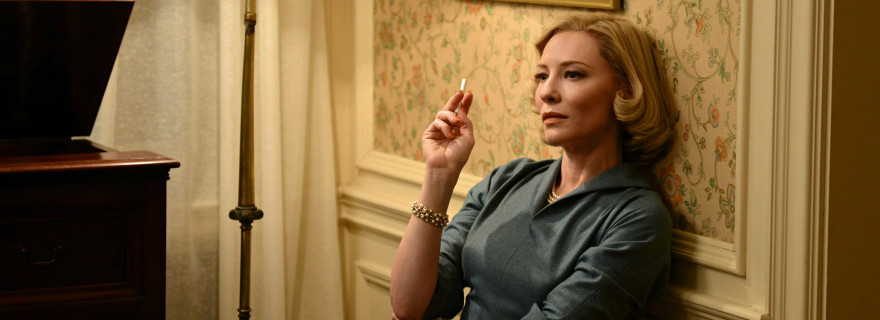'Carol'
Movie Rating:
3.5
A hit out of Cannes where Todd Haynes’ delicately crafted period romance went down like gangbusters, ‘Carol’ is the quiet art house flick of the year for folks who enjoy such things. It’s a film with no spectacle and only subdued drama. However, Haynes cooks his cinematic meal on simmer with such craft and skill that it’s difficult not to get swept up in the subtle charms.
Ultimately, it’s just a love story, one of those forlorn, longing and impossible ones. Yet, it’s created with such craft, passion and achingly restrained emotion that it almost reaches the heights of, say, Wong Kar-Wai’s ‘In the Mood for Love‘. Almost.
Set in the 1950s, our love-struck pair are both women and their story is just as smoldered by cultural repression as you’d imagine. Rooney Mara plays Therese, a depressed Manhattan department store clerk with dreams of pursuing photography, but who can’t quite seem to find her place in the world. She has a job and a boyfriend, but nothing feels quite right. Everything is cold and distant. Then Carol (Cate Blanchett), a rich housewife who’s equally imprisoned in her own unhappy circumstances, wanders into her store. They feel a connection immediately, but are unsure of how to act on it.
Eventually, Carol invites Therese to her home as thanks for returning a pair of lost gloves. It’s a lovely afternoon until her husband (Kyle Chandler) arrives. He knows instantly what’s going on, given that this isn’t the first woman of significance in his wife’s life. Fearing the end of his marriage, he becomes possessive, which works about as well as that nagging drive always tends to. He essentially pushes Carol into Therese’s arms, then makes their connection impossible and his divorce vicious. It’s bad news all around, despite the pure love at the core.
Yes, this is one of those movies that gets its power through longing glances and brief flourishes of impossible connection. It’s all lovingly, even somewhat fetishistically photographed by Haynes and his cinematographer Edward Lachman. That’s not to suggest that the sexuality of the central relationship is exploited in any way. Haynes knows the power of the impossible connection in a world of repression. The film feeds on it and entrances audiences through beautifully staged and photographed glances and subtle moments of longing. The tension is so palpable that the few moments of genuine connection almost feel like side dishes rather than the main attraction. The filmmaker milks the sexual and romantic tension of the piece like a master. The tale plays out with intriguing twists and turns, rooted in the political climate of the era. However, none of that is ever explored with too much unwarranted attention. Haynes isn’t making some sort of politicized rallying cry. He’s telling a love story. The setting just makes it all that much more difficult and delicious.
As usual, Haynes gets some remarkable work from his cast. Blanchett is as impressive as always, playing one of her typical headstrong characters, only this one is trapped in a world that never rewards her instincts and intentions, however right they might be. She chews scenery in the best possible sense, while Mara takes the opposite approach entirely. Playing a quiet character uncomfortable in her skin or capable of showing her inner self is tricky. It requires great control and discipline to communicate an inner life without ever really tipping the cards. Mara does so exquisitely, always in control and always at arm’s length. She’s an enigma, but one we come to love and somewhat understand. Her chemistry with Blanchett is palpable and their scenes together generate tremendous energy through pregnant silences. The supporting cast (particularly Kyle Chandler and Carrie Brownstein) are all strong as well, but they populate the sidelines by necessity. The film is a two-hander and it’s nearly impossible to tear your eyes off Blanchett and Mara whenever they share the screen.
‘Carol’ is a wonderfully made little love story. However, I’d hesitate to champion it as a masterpiece like many other critics have. It’s potent and powerful and beautifully constructed, but I ultimately felt it to be a little slight (by design of course). It’s a small and subtle tale of repression and passion that hits the right notes. It just never feels like it transcends the form. It does what it does handsomely and effectively, then disappears without fuss or muss. There’s nothing overtly wrong with the film, but nothing abnormally special about it. More importantly, the movie could too easily be spoiled by hype (and perhaps was somewhat for me). So don’t expect to see anything above and beyond what you’ve seen before. Just expect a strong and realistically fraught love story well told. That’s not a problem, except maybe when excessive superlatives are involved. In fact, this one is pretty wonderful in its own quiet little ways.




Bolo
Looking forward to this one. I remember when I went to see ‘Brokeback Mountain’ on opening weekend and a bunch of people got up and walked out after the point in the movie when the guys first hook up. My guess was that they knew nothing about the movie and just showed up at the cinema, looked at the poster and assumed it was a western. Maybe this one will get a bunch of people buying tickets thinking it’s just a Christmas movie.
Chris B
Lol I dunno, even the poster of Brokeback Mountain was pretty homo-erotic. I believe it had Ledger and Gyllenhall in a tender embrace while looking wistfully into the distance.